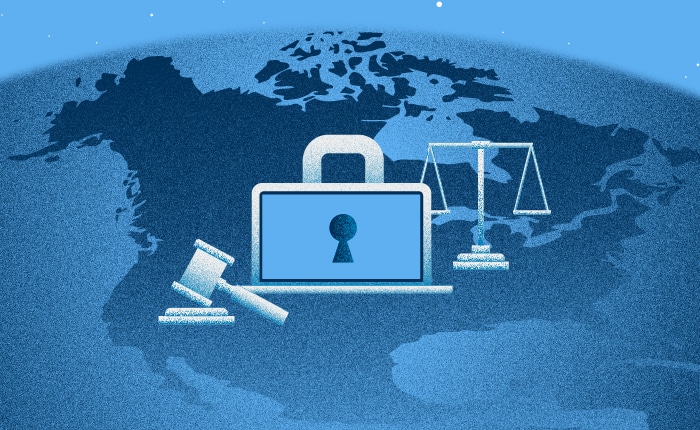Yo, peeps! Dive into the world of Understanding Data Privacy Laws where we break down the deets on how to protect your digital privacy like a boss. Get ready for a wild ride through the digital jungle of data security!
In today’s digital age, it’s crucial to understand the ins and outs of data privacy laws to keep your personal info safe and sound. From GDPR to CCPA, we’ve got you covered on all the need-to-know info.
Overview of Data Privacy Laws

In today’s digital age, data privacy laws play a crucial role in safeguarding individuals’ personal information from misuse, unauthorized access, and exploitation. These laws provide a framework for organizations to handle data responsibly and ensure the privacy rights of individuals are respected.
Key Data Privacy Laws
- The General Data Protection Regulation (GDPR): Enforced in the European Union, GDPR sets guidelines for the collection, processing, and storage of personal data.
- California Consumer Privacy Act (CCPA): Applies to businesses operating in California and gives consumers more control over their personal information.
- Data Protection Act 2018: Governs data protection laws in the UK and implements GDPR requirements post-Brexit.
Implications of Non-Compliance
Non-compliance with data privacy laws can lead to severe consequences for organizations, including hefty fines, legal actions, damage to reputation, and loss of customer trust. It is essential for businesses to adhere to these laws to protect both their customers’ data and their own interests.
General Principles of Data Privacy Laws

Data privacy laws are built on several fundamental principles that aim to protect individuals’ personal information. These principles include purpose limitation, data minimization, and transparency. Purpose limitation means that organizations should only collect data for specific, legitimate purposes and not use it for other reasons. Data minimization requires organizations to limit the amount of personal data collected to what is necessary for the intended purpose. Transparency entails informing individuals about how their data is being used and ensuring transparency in data processing activities.
Adhering to Principles in Data Processing
Organizations can adhere to these principles in their data processing activities by:
- Clearly defining the purpose for collecting data and obtaining consent from individuals.
- Collecting only the necessary data and minimizing the amount of personal information stored.
- Providing clear and easily accessible privacy policies to inform individuals about data processing practices.
- Implementing security measures to protect personal data from unauthorized access or breaches.
Rights Granted to Individuals, Understanding Data Privacy Laws
Data privacy laws typically grant individuals certain rights to help them control their personal information. These rights may include:
- The right to access their personal data held by organizations.
- The right to request corrections or updates to inaccurate or outdated information.
- The right to request the deletion of their data under certain circumstances (right to be forgotten).
- The right to withdraw consent for data processing activities.
GDPR (General Data Protection Regulation)
The GDPR, or General Data Protection Regulation, is a comprehensive data privacy law that was implemented in the European Union in 2018. This regulation aims to protect the personal data of EU citizens and residents, giving them more control over how their data is collected, processed, and stored.
Key Components of the GDPR
- The GDPR requires businesses to obtain explicit consent before collecting personal data from individuals.
- It mandates that organizations must inform individuals about how their data will be used and processed in a clear and transparent manner.
- Businesses must also implement appropriate security measures to protect personal data from breaches or unauthorized access.
- The GDPR grants individuals the right to access, rectify, and erase their personal data upon request.
Comparison with Other Data Privacy Regulations
- One unique aspect of the GDPR is its extraterritorial reach, meaning it applies to organizations outside the EU if they offer goods or services to EU residents or monitor their behavior.
- Unlike other data privacy regulations, the GDPR imposes severe penalties for non-compliance, with fines of up to 4% of a company’s global annual revenue or €20 million, whichever is higher.
- The GDPR also introduces the concept of a Data Protection Officer (DPO) for certain organizations, responsible for ensuring compliance with the regulation.
Extraterritorial Reach of the GDPR
The extraterritorial reach of the GDPR has significant implications for organizations outside the EU. Even if a company is based in a non-EU country, it may still need to comply with the GDPR if it processes the personal data of EU residents. This means that businesses around the world need to understand and adhere to the requirements of the GDPR to avoid hefty fines and maintain trust with their customers.
CCPA (California Consumer Privacy Act): Understanding Data Privacy Laws
The California Consumer Privacy Act (CCPA) is a state statute intended to enhance privacy rights and consumer protection for residents of California. It aims to give consumers more control over their personal information and requires businesses to be transparent about their data collection and sharing practices.
Main Provisions of the CCPA and Objectives
- CCPA gives consumers the right to know what personal information is being collected about them by businesses.
- It allows consumers to opt out of the sale of their personal information and gives them the right to request deletion of their data.
- The CCPA requires businesses to provide clear privacy policies and implement reasonable security measures to protect consumer data.
Differences Between CCPA and GDPR
- Scope: CCPA applies to businesses that meet certain criteria and collect personal information of California residents, while GDPR applies to all businesses that process personal data of individuals in the European Union.
- Requirements: CCPA focuses on giving consumers control over their data and requires businesses to disclose information about data collection practices, while GDPR emphasizes the protection of personal data through strict regulations and requirements.
Compliance Measures for CCPA Obligations
- Implementing data mapping to understand what personal information is collected and where it is stored.
- Updating privacy policies to include required disclosures and information about consumer rights under CCPA.
- Providing opt-out mechanisms for consumers who do not want their data to be sold.
- Training employees on data privacy practices and ensuring compliance with CCPA requirements.